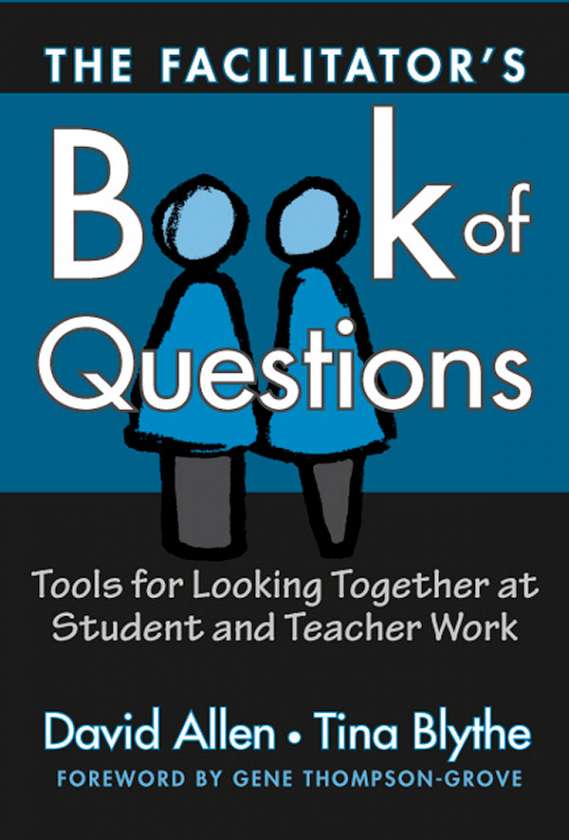Professors: Request an Exam Copy
Print copies available for US orders only. For orders outside the US, see our international distributors.
Publication Date: April 29, 2004
Pages: 160

This book is an essential tool for facilitators of groups using protocols, or structured conversations, to collaboratively review student and teacher work. A follow-up to Looking Together at Student Work and Assessing Student Learning, this resource considers the purposes for engaging in collaborative review and provides some of the most effective strategies for using protocols to support successful group work.
Features:
David Allen is a researcher at the National Center for Restructuring Education, Schools, and Teaching (NCREST), Teachers College, Columbia University. Tina Blythe is a researcher with Project Zero at the Harvard Graduate School of Education and teaches in the faculty development program of the Boston Architectural Center.
“In reading this book, facilitators will expand their repertoire and walk away with ideas and tips for responding to the wide range of facilitation issues that invariably come up in protocols.”
¾From the Foreword by Gene Thompson-Grove
“Insightful and immediately useful, Allen and Blythe's book is a must read for teachers and administrators committed to professional collaboration.”
Katherine Simon, Coalition of Essential Schools, author of Moral Questions in the Classroom
“A deep and artful book for educators of all kinds.”
David Perkins, Harvard Graduate School of Education, author of King Arthur's Round Table and Smart Schools
“I plan to use this book to guide our faculty in having the kind of conversations about teaching and learning that will ultimately benefit student achievement.”
—Judi Aronson, School Principal, Brooklyn, New York
Table of Contents
Foreword by Gene Thompson-Grove
Acknowledgments
Introduction
Why a Book of Questions for Facilitators?
Why a Book of Questions for Facilitators of Protocols?
What Do We Mean by Student Work and Teacher Work?
Who Is This Book For?
How Is This Book Organized?
What Doesn't This Book Do?
How Might This Book Be Used?
Chapter 1: What Are Protocols and How Do They Work?
What Is a Protocol?
The Purposes of a Protocol
The Anatomy of a Protocol
The Spirit ofa Protocol
The Authority of a Protocol
Beyond the Protocol
Chapter 2. How Are Protocols Different from Other Kinds of Professional Development?
What's So Special About Protocols?
What Does This Mean for the Facilitator's Role in a Protocol
Chapter 3. What Do Facilitators Do? The Big Picture
Facilitating Learning, Logistics, and Longevity
Facilitators' "Thinking Dispositions":Reading, Responding, and Reflecting
Chapter 4: What Do Facilitators Do in a Protocol?
Getting a Protocol (and Each Individual Step of the Protocol) Started
Moving Through the Protocol
Debriefing the Protocol
An Example: Moves in the Context of a Protocol
Summing Up
Chapter 5: What Kinds of Questions Get Asked in a Protocol
Focusing Questions
Clarifying Questions
Probing Questions
Chapter 6: What Happens Before and After Protocols?
Before the Meeting
After the Meeting
Chapter 7: How Do Facilitators Choose, Adapt, and Create Protocols?
Choosing an Appropriate Protocol
Making Adjustments, Adapting Protocols, and Creating New Protocols
Chapter 8: What Are the Challenges of Facilitating Protocols?
Time Is Running Out
The Group Is Too Big
Participants Have a Hard Time Sticking With the Protocol
Participants Rush to Evaluate or Judge the Work Being Presented
Participants Seem Reluctant to Offer Challenging Feedback
The Presenting Teacher's Presentation Wanders or Expands
The Presenting Teacher Uses Her Response Time for Something Other than Response
Participants Turn to Other Participants, or to the Facilitator, as an Expert on the Content
The Facilitator Is Uncertain Whether to Participate in the Content of the Conversation or Stick to Facilitating the Process
The Facilitator Feels a Bit Hesitant or Unsure of Her Skills
One or More Participants Deliberately Resist Participating in the Protocol
Chapter 9: How Do Facilitators Get Better?
Observing and Emulating
Experimenting
Asking for Feedback
Reflecting
Documenting
Appendix A: Additional Resources
Appendix B: Activities
References
About the Authors
Professors: Request an Exam Copy
Print copies available for US orders only. For orders outside the US, see our international distributors.